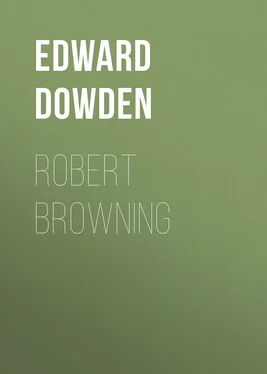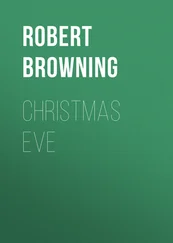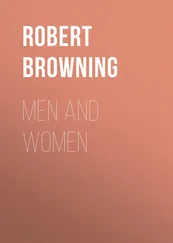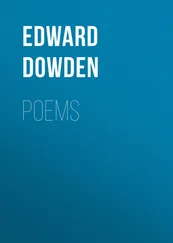Edward Dowden - Robert Browning
Здесь есть возможность читать онлайн «Edward Dowden - Robert Browning» — ознакомительный отрывок электронной книги совершенно бесплатно, а после прочтения отрывка купить полную версию. В некоторых случаях можно слушать аудио, скачать через торрент в формате fb2 и присутствует краткое содержание. Жанр: Биографии и Мемуары, Поэзия, foreign_antique, foreign_prose, foreign_poetry, на английском языке. Описание произведения, (предисловие) а так же отзывы посетителей доступны на портале библиотеки ЛибКат.
- Название:Robert Browning
- Автор:
- Жанр:
- Год:неизвестен
- ISBN:нет данных
- Рейтинг книги:5 / 5. Голосов: 1
-
Избранное:Добавить в избранное
- Отзывы:
-
Ваша оценка:
- 100
- 1
- 2
- 3
- 4
- 5
Robert Browning: краткое содержание, описание и аннотация
Предлагаем к чтению аннотацию, описание, краткое содержание или предисловие (зависит от того, что написал сам автор книги «Robert Browning»). Если вы не нашли необходимую информацию о книге — напишите в комментариях, мы постараемся отыскать её.
Robert Browning — читать онлайн ознакомительный отрывок
Ниже представлен текст книги, разбитый по страницам. Система сохранения места последней прочитанной страницы, позволяет с удобством читать онлайн бесплатно книгу «Robert Browning», без необходимости каждый раз заново искать на чём Вы остановились. Поставьте закладку, и сможете в любой момент перейти на страницу, на которой закончили чтение.
Интервал:
Закладка:
A time came when Robert Browning must make choice of a future career. His interests in life were manifold, but in some form or another art was the predominant interest. His father remembered his own early inclinations, and how they had been thwarted; he recognised the rare gifts of his son, and he resolved that he should not be immured in the office of a bank. Should he plead at the bar? Should he paint? Should he be a maker of music, as he at one time desired, and for music he always possessed an exceptional talent? When his father spoke to him, Robert Browning knew that his sister was not dependent on any effort of his to provide the means of living. "He appealed," writes Mr Gosse, "to his father, whether it would not be better for him to see life in the best sense, and cultivate the powers of his mind, than to shackle himself in the very outset of his career by a laborious training, foreign to that aim. … So great was the confidence of the father in the genius of his son that the former at once acquiesced in the proposal." It was decided that he should take to what an old woman of the lake district, speaking of "Mr Wudsworth," described as "the poetry business." The believing father was even prepared to invest some capital in the concern. At his expense Paracelsus, Sordello , and Bells and Pomegranates were published.
A poet may make his entrance into literature with small or large inventions, by carving cherry-stones or carving a colossus. Browning, the creator of men and women, the fashioner of minds, would be a sculptor of figures more than life-size rather than an exquisite jeweller; the attempt at a Perseus of this Cellini was to precede his brooches and buttons. He planned, Mr Gosse tells us, "a series of monodramatic epics, narratives of the life of typical souls." In a modification of this vast scheme Paracelsus , which includes more speakers than one, and Sordello , which is not dramatic in form, find their places. They were preceded by Pauline , in the strictest sense a monodrama, a poem not less large in conception than either of the others, though this "fragment of a confession" is wrought out on a more contracted scale.
Pauline , published without the writer's name—his aunt Silverthorne bearing the cost of publication—was issued from the press in January 1833. 12 12 Even the publishers—Saunders and Otley—did not know the author's name.—"Letters of R.B. and E.B.B.," i. 403.
Browning had not yet completed his twenty-first year. When including it among his poetical works in 1867, he declared that he did so with extreme repugnance and solely with a view to anticipate unauthorised republication of what was no more than a "crude preliminary sketch," entirely lacking in good draughtsmanship and right handling. For the edition of twenty years later, 1888, he revised and corrected Pauline without re-handling it to any considerable extent. In truth Pauline is a poem from which Browning ought not to have desired to detach his mature self. Rarely does a poem by a writer so young deserve better to be read for its own sake. It is an interesting document in the history of its author's mind. It gives promises and pledges which were redeemed in full. It shows what dropped away from the poet and what, being an essential part of his equipment, was retained. It exhibits his artistic method in the process of formation. It sets forth certain leading thoughts which are dominant in his later work. The first considerable production of a great writer must always claim attention from the student of his mind and art.
The poem is a study in what Browning in his Fifine terms "mental analysis"; it attempts to shadow forth, through the fluctuating moods of the dying man, a series of spiritual states. The psychology is sometimes crude; subtle, but clumsily subtle; it is, however, essentially the writer's own. To construe clearly the states of mind which are adumbrated rather than depicted is difficult, for Browning had not yet learnt to manifest his generalised conceptions through concrete details, to plunge his abstractions in reality. The speaker in the poem tells us that he "rudely shaped his life to his immediate wants"; this is intelligible, yet only vaguely intelligible, for we do not know what were these wants, and we do not see any rude shaping of his life. We are told of "deeds for which remorse were vain"; what were these deeds? did he, like Bunyan, play cat on Sunday, or join the ringers of the church bells? "Instance, instance," we cry impatiently. And so the story remains half a shadow. The poem is dramatic, yet, like so much of Browning's work, it is not pure drama coming from profound sympathy with a spirit other than the writer's own; it is only hybrid drama, in which the dramatis persona thinks and moves and acts under the necessity of expounding certain ideas of the poet. Browning's puppets are indeed too often in his earlier poems moved by intellectual wires; the hands are the hands of Luria or Djabal, but the voice is the showman's voice. A certain intemperance in the pursuit of poetic beauty, strange and lovely imagery which obscures rather than interprets, may be regarded as in Pauline the fault or the glory of youth; a young heir arrived at his inheritance will scatter gold pieces. The verse has caught something of its affluent flow, its wavelike career, wave advancing upon wave, from Shelley:
'Tis he, I ken the manner of his gait;
He rises on the toe; that spirit of his
In aspiration lifts him from the earth.
The aspiration in Browning's later verse is a complex of many forces; here it is a simple poetic enthusiasm.
By virtue of its central theme Pauline is closely related to the poems which at no great distance followed— Paracelsus and Sordello . Each is a study of the flaws which bring genius to all but ruin, a study of the erroneous conduct of life by men of extraordinary powers. In each poem the chief personage aspires and fails, yet rises—for Browning was not of the temper to accept ultimate failures, and postulated a heaven to warrant his optimistic creed—rises at the close from failure to a spiritual recovery, which may be regarded as attainment, but an attainment, as far as earth and its uses are concerned, marred and piteous; he recovers in the end his true direction, but recovers it only for service in worlds other than ours which he may hereafter traverse. He has been seduced or conquered by alien forces and through some inward flaw; he has been faithless to his highest faculties; he has not fulfilled his seeming destiny; yet before death and the darkness of death arrive, light has come; he perceives the wanderings of the way, and in one supreme hour or in one shining moment he gives indefeasible pledges of the loyalty which he has forfeited. Shelley in Alastor , the influence of which on Browning in writing Pauline is evident, had rebuked the idealist within himself, who would live in lofty abstractions to the loss of human sympathy and human love. Browning in Pauline also recognises this danger, but he indicates others—the risk of the lower faculties of the mind encroaching upon and even displacing the higher, the risk of the spirit of aggrandisement, even in the world of the imagination, obtaining the mastery over the spirit of surrender to that which is higher than self. It is quite right and needful to speak of the "lesson" of Browning's poem, and the lesson of Pauline is designed to inculcate first loyalty to a man's highest power, and secondly a worshipping loyalty and service to that which transcends himself, named by the speaker in Pauline by the old and simple name of God.
Was it the problem of his own life—that concerning the conduct of high, intellectual and spiritual powers—which Browning transferred to his art, creating personages other than himself to be exponents of his theme? We cannot tell; but the problem in varied forms persists from poem to poem. The poet imagined as twenty years of age, who makes his fragment of a confession in Pauline , is more than a poet; he is rather of the Sordello type than of the type represented in Eglamor and Aprile. 13 13 "V.A. xx," following the quotation from Cornelius Agrippa means "Vixi annos xx," i.e. "the imaginary subject of the poem was of that age."—Browning to Mr T.J. Wise.
Through his imagination he would comprehend and possess all forms of life, of beauty, of joy in nature and in humanity; but he must also feel himself at the centre of these, the lord and master of his own perceptions and creations; and yet, at the same time, this man is made for the worship and service of a power higher than self. How is such a nature as this to attain its true ends? What are its special dangers? If he content himself with the exercise of the subordinate faculties, intellectual dexterity, wit, social charm and mastery, he is lost; if he should place himself at the summit, and cease to worship and to love, he is lost. He cannot alter his own nature; he cannot ever renounce his intense consciousness of self, nor even the claim of self to a certain supremacy as the centre of its own sympathies and imaginings. So much is inevitable, and is right. But if he be true to his calling as poet, he will task his noblest faculty, will live in it, and none the less look upward, in love, in humility, in the spirit of loyal service, in the spirit of glad aspiration, to that Power which leans above him and has set him his earthly task.
Интервал:
Закладка:
Похожие книги на «Robert Browning»
Представляем Вашему вниманию похожие книги на «Robert Browning» списком для выбора. Мы отобрали схожую по названию и смыслу литературу в надежде предоставить читателям больше вариантов отыскать новые, интересные, ещё непрочитанные произведения.
Обсуждение, отзывы о книге «Robert Browning» и просто собственные мнения читателей. Оставьте ваши комментарии, напишите, что Вы думаете о произведении, его смысле или главных героях. Укажите что конкретно понравилось, а что нет, и почему Вы так считаете.












